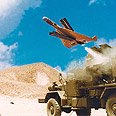
Israel becomes world's 4th largest arms exporter, defense officials say
Surpassing England in arms exports, Israel enacts new law to stem flow of arms to war torn countries and controversial regimes
Israel became the world's fourth largest defense exporter in 2007, surpassing Britain, with $4.3 billion in signed contracts, officials said Tuesday.
Israel exports mostly radar systems, drones and anti-tank missiles to India, Turkey, Britain, the United States and other Western nations, defense officials said on condition of anonymity because of the sensitive nature of the information.
But Israel has earned a questionable reputation for the small percentage of its sales - usually of shells, rifles and ammunition - that go to war-torn countries, analysts said.
A new Israeli law attempts to ensure that Israeli weapons do not end up in the wrong hands. Under pressure from the United States, Israel enacted the law that will make it illegal for Israeli residents to sell any weapons, even if they are not Israeli made, to embargoed countries or militias.
Those convicted could serve as much as three years in prison and be fined up to $1.5 million, said Eli Pinko, the head of the new inspection department set up to comply with the law.
The law will take effect Jan. 1. Israelis - often senior former commanders - have in the past sold arms to embargoed countries and groups. Despite the violations and international pressure on Israel to take action, local law did not allow for their arrests.
"About five percent of the exports are meant for problematic countries in the third world, in Asia and Africa, for countries that are in the midst of civil war," said military affairs expert Yossi Melman. "These are the markets that give Israel a bad name."
Israel also deals with countries with poor human rights records, like a sale to Zimbabwe in 2001 of crowd dispersal equipment that was later used against demonstrators protesting dictator Robert Mugabe's rule, Amnesty International's Israel branch said.
Amnesty International: Law must go further
Amnesty welcomed Israel's attempt to improve its laws but the organization's campaign director, Ilan Lonai, said the efforts needed to go further.
"Israel needs to come up to standards that are not only better than what they are at the moment, but to international standards, like those of the United States and European Union," Lonai said.
Israeli defense officials have said Israel must export arms to keep its defense industries viable. Israel needs to develop and manufacture its own weapons for its military, which faces threats from hostile neighbors, but the Israeli military by itself is too small a market to sustain the industry.
There have been several international cases involving Israelis and shady arms deals over the years. Israeli agents have been implicated in civil wars and uprisings in several parts of Africa and South America.
In one prominent case, a former Israeli naval commander was arrested in Romania in the late 1990s on suspicion of selling Romanian arms to war-torn Angola despite a UN ban, Melman said.
The suspect, Shimon Hershkovitz, had received a so-called "security assistance license" From Israel to deal in arms by bribing the defense ministry of Togo for an end user certificate - to make it appear the arms would be used there, Melman said.
The United Nations appealed to Israel to request legal action against the suspect, but Israel said it knew nothing about the man, Melman said. In the end, Israeli pressure on Romania forced the release of the suspect and he never was convicted, Melman said. Israelis have also been suspect in sales to Croatia during the war there in the mid-1990s and to Ivory Coast and Nigeria.










